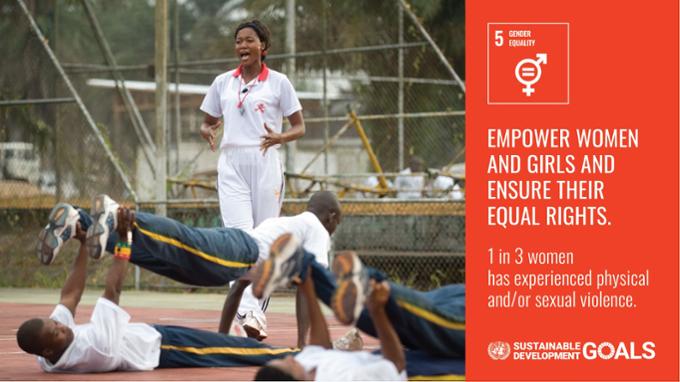Gender Equality
The University fosters an equitable and diverse campus environment that encourages and supports the inclusion of all members of the community. We have established employment and educational practices that respect the dignity of individuals and make it possible to live, work, and learn in a positive and supportive environment, free from discrimination and harassment.
Learn more about our current demographics, as well as the policies and resources that support equal access and participation.
U of R Factoids (2022)

Related Courses
EFDN 803 - Social Justice and Globalization from an Educational Perspective
Explores the research and classroom practice of themes including activist teachers, health, basic education, HIV/AIDS, child protection, gender equality, diversity, multiculturalism, First Nations, infrastructure services, human rights, citizenship, democracy, good governance, private sector development, environment, sustainability, making a difference; and the implications of integrating these themes into the mainstream curriculum.
ENGL 310AL - Indigenous Feminism and Women's Writings
During this seminar class, students will engage in critical discussions involving justice and power for/by Indigenous women, gendered violence, Indigenous feminism, intergenerational trauma, women’s residential school narratives and literary writings as restorative justice. Through lectures, readings, and screenings, students will develop critical and interdisciplinary tools for analyzing Indigenous literary discourses.
***Prerequisite of ENGL 100 and either ENGL 110 or the completion of 48 credit hours***
ENGL 336AP - 19th C Political Imagination
A study of selected Victorian texts in several genres, which predict or suggest what's coming next, with respect to politics and society, and how what's coming next should be embraced or resisted, including themes such as: democracy, unions, gender equality, and university education.
***Prerequisite: ENGL 100 and either ENGL 110 or completion of 48 credit hours.***
ENGL 410AC - Poststructuralism and Shakespeare
This course uses select plays by Shakespeare as test cases to examine the challenges presented by five poststructuralist approaches - deconstruction, psychoanalysis, Marxism, feminism, and queer theory. The course explores how poststructuralism aids us in formulating an ethics of the other in Shakespeare's plays.
*Note: This course is intended for ENGL Honours students. Students who are not ENGL Honours students require permission of the Department Head to register.*
*Note: Students may receive credit for one of ENGL 410AC or ENGL 802AC.*
ENGL 802AC - Poststucturalism and Shakespeare
This course uses select plays by Shakespeare as test cases to examine the challenges presented by five poststructuralist approaches - deconstruction, psychoanalysis, Marxism, feminism, and queer theory. The course explores how poststructuralism aids us in formulating an ethics of the other in Shakespeare's plays.
*Note: Students may receive credit for one of ENGL 802AC or ENGL 410AC.*
GBUS 875 - Women in Leadership
This course is designed to enhance understanding of issues relevant to women in leadership and the implications for organizations (e.g., opportunities, exclusion). Topics include leadership styles, women on boards, strategies for change, learning to become a leader, media representation, intra-gender relations between women, cross-cultural considerations, and entrepreneurship. The course will combine both scholarly and practitioner-based considerations and challenge students to surface and unsettle taken for granted assumptions about women in leadership. Guest speakers from industry and academia will be invited to share their views on specific topics to enhance the learning experience.
INSW 402 - Indigenous Social Work Practice and Human Sexuality
Indigenous social work explores human sexuality at a personal, community, and national level. Through connecting the personal to the political, the course will address issues of sexual abuse and healing, and sexual violence and the sex trade.
***Must be accepted into the School of Indigenous Social Work (SISW).***
IS 390AL - Indigenous Human Rights
Current developments at the international level with respect to rights of Indigenous peoples, particularly at the level of the United Nations is the focus. It reviews the UN Declaration of the Rights of Indigenous peoples (UNDRIP) with special attention to issues of violence against women, child removal and environmental degradation.
***Prerequisite: IS 100 or 30 credit hours.***
IS 420 - Advanced Topics in International Development
This seminar course examines critical perspectives of international development. Topics include, among others, strategies to alleviate poverty, population growth and scarcity, urbanization, land rights, microfinance, displacement and development refugees, environmental sustainability, and the role of civil society in development.
***Prerequisite: IS 220 and 60 credit hours, or permission of the department head***
*Note: Formerly numbered DEVS 400. Students may receive credit for one of DEVS 400 or IS 420*
JS 412 - Environment and Justice
Traces environmental movements, environmental ethics, evolution of environmental assessment/protection, criminalization of pollution, and international environmental agreements. Approached from several perspectives: deep ecology, social ecology, green politics, sustainable development, bio-regionalism and eco-feminism.
***Prerequisite: Completion of 30 credit hours including JS 090 and JS 100, or permission of the Department Head.***
PHIL 245 - Philosophy of Feminism
A philosophical examination of key issues of and about feminism. Topics may include: feminist epistemology, conceptions of equality, censorship, pornography, employment equity.
*** Prerequisite: PHIL 100 or completion of 15 credit hours ***
PHIL 275 - Environmental Ethics
A philosophical examination of moral, social, and political issues concerning the environment. Topics may include: the nature of Nature; the moral status of non-human animals, species, and eco-systems; the relationship between economic systems and the environment; environmental aesthetics; ownership and use of resources; population and future generations; eco-feminism.
*** Prerequisite: PHIL 100 or completion of 15 credit hours ***
PSCI 100 - People, Power and Politics: An Introduction
An introduction to the issues, concepts and institutions of contemporary politics in both Canadian and international contexts, inviting critical thinking on subjects such as power, citizenship, democracy, diversity, feminism and colonialism. It links these topics to current world political events and issues. The objectives of the course are to introduce concepts and approaches in political studies; and to cultivate civic education.
PSYC 321 - Forensic Psychology
An overview of the field of forensic psychology – the intersection of psychology and the law. Topics include: psychology of police investigations, deception, eyewitness testimony, child victims and witnesses, juries, mental illness in court, sentencing and parole, domestic violence, sexual offenders, psychopathy, risk assessment, and special offender populations. ***Prerequisite: PSYC 101 and PSYC 102, or 60 credit hours and permission of the Department Head.***
*Note: Students may receive credit for one of PSYC 321 or PSYC 320 as a forensic course.*
*Note: This course will initially be restricted to PSYC majors and Certificate in Forensic Psychology students. Non-majors will be eligible to register at a later point if space remains.*
PSYC 330 - Psychology of Women
An examination of the major theories, research methodologies, and data in the field of the psychology of women. Philosophical values of feminism and the psychological impact of women's historical roles in society, and cultural perspectives pertaining to women will be considered throughout.
***Prerequisite: PSYC 101, PSYC 102, and two 200 level courses in the social sciences, or permission of the Department Head.***
*Note: This course will initially be restricted to PSYC majors. Non-majors will be eligible to register at a later point if space remains.*
PSYC 388AI - Human Sexuality
This course covers many aspects of human sexuality focusing on both theory and current research. The basics of sex and sexuality will be explored, including history of sex research, sexual anatomy, and the nature of sexual response. Specialized topics, such as sexual dysfunctions and sexual violence, will also be discussed.
***Prerequisite: PSYC 101 or PSYC 102 or permission of the department head and completion of 60 credit hours.***
*Note: This course will initially be restricted to PSYC majors. Non-majors will be eligible to register at a later point if space remains.*
SOC 212 - Gender and Sexuality
This course introduces students to sociological perspectives on gender and sexuality in contemporary society. Key topics include: gender and sexual identity, gender inequality, and changing definitions of masculinity and femininity. Students will be introduced to various theoretical perspectives on gender and sexuality, including feminist theories, LGBT studies, and queer theory.
***Prerequisite: Completion of 12 credit hours or SOC 100 or permission of Department Head.***
*Note: SOC 100 is required for all majors in Sociology*
SOST 890BB - The Sociology of Exclusion
A directed readings and research course that engages students in in-depth analysis of a historical or contemporary case project involving racialization, and gender discrimination, making use of theory and concepts from the social sciences related to the issues of systemic and institutionalized discrimination.
SRS 491AC - Socio-Cultural Trends in Sport and Recreation
The purpose of this independent study class is to develop a theoretical and applied understanding of socio-cultural trends in the sport and recreation industry. In this course, the student determines both the trend (e.g., diversity, inclusion, feminism, multiculturalism, indigenization) and the context in which to study the trend.
WGST 100 - Introduction to Women's and Gender Studies
This course will examine the historical development of feminism and women's studies. Women's representation in academic practice will be analyzed using examples from humanities, the arts, and social sciences. Strategies for change and for the empowerment of women will be considered.
WGST 207 - Indigenous Feminisms
This class focuses on Indigenous women and feminist analysis, identity, activism and the interplay of gender, colonialism, racism and sexism on Indigenous women today. The parameters of Indigenous feminisms and its relevance to culture and community inside and outside of Canada are also examined.
***Prerequisite: WGST 100 or permission of instructor.***
*Note: Students may receive credit for one WGST 207 or WGST 280AH.*
WGST 301 - Women and Health: Local and Global
This course examines a wide range of issues in women's health and wellness from a critical feminist perspective. It will cover a range of topics such as the ramifications of the biomedical model for women's health, disparities in women's health, AIDS, mental health, violence against women, aging, disabilities, and reproduction.
***Prerequisite: Completion of 30 credit hours, or permission of the Department Head.***
WGST 880AI - Violence and Indigenous Women
This course will engage postcolonial, feminist, Indigenous and poststructuralist theory to examine the discourse on missing and murdered Indigenous Women. Working from our national context and moving to a global perspective, students will identify patterns of violence and resistance and become skilled at historical, political, gendered, economic and cultural analyses.
